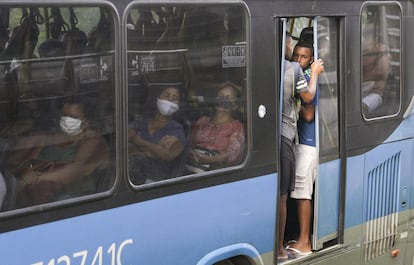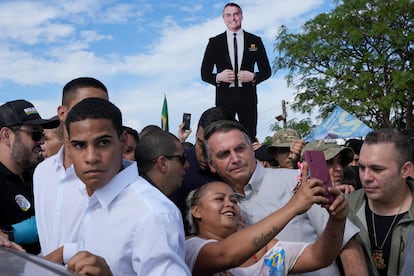Brazilian cities to offer free public transportation on election day
State capitals across Brazil will be organizing buses to help the poorest citizens get to polling stations, but Jair Bolsonaro believes the measure will favor his opponent, Lula

In most Brazilian cities, a round trip by bus or subway costs about eight reais, or $1.50. It may not seem like much, but in a country where 33 million people often struggle to eat, sometimes it’s better to save on a trip to more easily afford a meal.
While voting is mandatory in Brazil, the fine for not completing this civic duty is symbolic: three-and-a-half reais, or 65 cents. Spending hours stuck in traffic for more than twice the price often doesn’t seem worth it.
In the first round of the Brazilian presidential elections, held on October 2, more than 31 million voters stayed home - about 20% of the electorate. To fight high abstention rates, several cities and states promoted free public transit on election day. They plan to go even further during the second round this Sunday.
A total of 26 state capitals will offer free buses on October 30. Another 150 cities have also joined the initiative. Many municipal governments will even add vehicles to alleviate waiting times. For instance, in São Paulo - home to nearly 12 million people - the city council will put an extra 2,000 public buses on the streets to transport voters. This is an unprecedented mobilization, having never previously occurred in Brazilian elections.
For Vitor Mihessen, coordinator of Casa Fluminense, a civil society organization based in Rio de Janeiro, the expansion of free public transportation on election day is good news for lower-income voters.
“There are many people living on the street, people who have lost their homes and keep their voter registration tied to the place where they lived before, or people that, due to the [pandemic], had to go live in a cheaper neighborhood, or in a favela. They haven’t updated their polling location,” he told EL PAÍS via telephone. “Many people live far away from where they must vote.”
Brazilian public transportation is still suffering the after effects of the pandemic. Due to the massive decline in the number of passengers, the bus concession companies - used by the vast majority of the population - had to cut many lines, which have not been put back in circulation since. Mobility problems have persisted. For this reason, Mihessen stresses that it’s important not only to ensure that transportation is free, but that it actually works. “All this is useless if Sunday comes and there are no buses, or if they run every two hours.”

Brazil divided on free transport issue
At first glance, it might seem that there’s a political consensus in favor of the initiative to help get people to the polls, but that’s not exactly the case. Before the first round, President Jair Bolsonaro’s campaign team appealed to the Electoral Court, requesting that free transit be prevented, alleging that it represented a “serious interference” in the operation of public transit, one that could benefit certain candidates. The Bolsonaro camp also claimed that municipalities could not afford to assume the financial cost of this move.
Ultimately, these arguments were rejected and classified as “absurd” for comparing universal public transportation to institutional support for certain political groups - something which is prohibited by law. The Supreme Court also weighed in, assuring Brazilians that mayors who made public transit free on election days would not be committing any infractions. This encouraged many cities to join the initiative.
Bolsonaro’s real worry is that free public transit on Sunday will boost turnout for his opponent, Luiz Inácio Lula da Silva - popularly known as “Lula” - who governed from 2003 until 2011. Those who travel by bus or train in Brazil tend to have less purchasing power and, as a general rule, poorer Brazilians tend to vote for Lula’s Workers’ Party. Easing their way to the polls may help the former president return to power.
In Lula’s camp, meanwhile, there is concern that several governors and mayors aligned with Bolsonaro’s right-wing coalition will impose obstacles to the transit plan on voting day.
For instance, the conservative government of the State of São Paulo - which has authority over critical bus and metro networks - has not yet ruled on the debate, despite strong pressure from the Prosecutor’s Office, which has demanded that the regional authorities guarantee the right to free public transit on election day. Meanwhile, in Rio de Janeiro, the second biggest city in Brazil, the pro-Lula mayor (who is offering free buses) is clashing with the governor of the state, a Bolsonaro ally who controls the local train network.
In Minas Gerais - a key state that tends to tip the balance in close elections - right-wing Governor Romeu Zema has refused to instate free public transport. Lula’s campaign has accused him of pressuring the mayors in his jurisdiction to also refuse to partake in the initiative. One of the state’s senators, progressive Alexandre Silveira, accused Zema of committing a crime: “Voters in rural areas, with low incomes, need help from the public authorities to be able to exercise their citizenship.”
Tu suscripción se está usando en otro dispositivo
¿Quieres añadir otro usuario a tu suscripción?
Si continúas leyendo en este dispositivo, no se podrá leer en el otro.
FlechaTu suscripción se está usando en otro dispositivo y solo puedes acceder a EL PAÍS desde un dispositivo a la vez.
Si quieres compartir tu cuenta, cambia tu suscripción a la modalidad Premium, así podrás añadir otro usuario. Cada uno accederá con su propia cuenta de email, lo que os permitirá personalizar vuestra experiencia en EL PAÍS.
¿Tienes una suscripción de empresa? Accede aquí para contratar más cuentas.
En el caso de no saber quién está usando tu cuenta, te recomendamos cambiar tu contraseña aquí.
Si decides continuar compartiendo tu cuenta, este mensaje se mostrará en tu dispositivo y en el de la otra persona que está usando tu cuenta de forma indefinida, afectando a tu experiencia de lectura. Puedes consultar aquí los términos y condiciones de la suscripción digital.








































